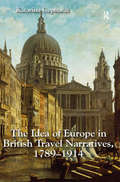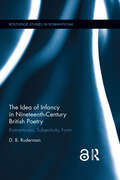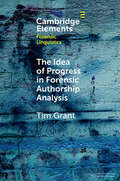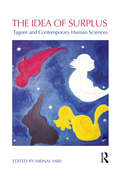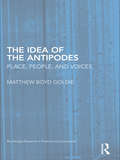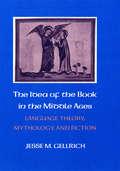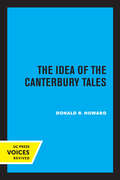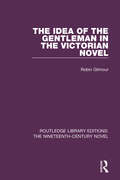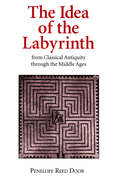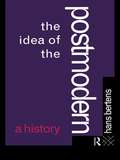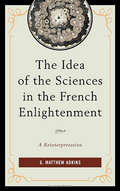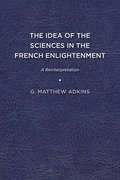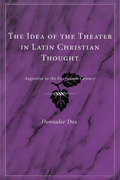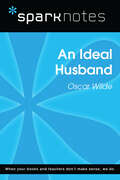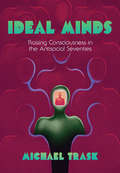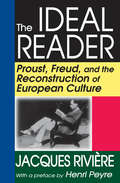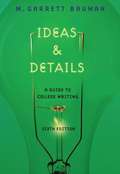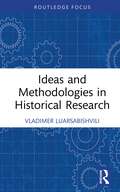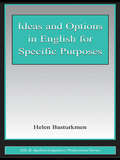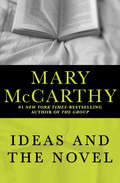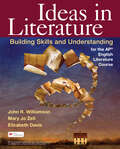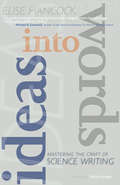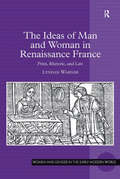- Table View
- List View
The Idea of Europe in British Travel Narratives, 1789-1914
by Katarina GephardtThe nineteenth century was the heyday of travel, with Britons continually reassessing their own culture in relation to not only the colonized but also other Europeans, especially the ones that they encountered on the southern and eastern peripheries of the continent. Offering illustrative case studies, Katarina Gephardt shows how specific rhetorical strategies used in contemporary travel writing produced popular fictional representations of continental Europe in the works of Ann Radcliffe, Lord Byron, Charles Dickens, and Bram Stoker. She examines a wide range of autobiographical and fictional travel narratives to demonstrate that the imaginative geographies underpinning British ideas of Europe emerged from the spaces between fact and fiction. Adding texture to her study are her analyses of the visual dimensions of cross-cultural representation and of the role of evolving technologies in defining a shared set of rhetorical strategies. Gephardt argues that British writers envisioned their country simultaneously as distinct from the Continent and as a part of Europe, anticipating the contradictory British discourse around European integration that involves both fear that the European super-state will violate British sovereignty and a desire to play a more central role in the European Union.
The Idea of Infancy in Nineteenth-Century British Poetry: Romanticism, Subjectivity, Form (Routledge Studies in Romanticism)
by D.B. RudermanThis book radically refigures the conceptual and formal significance of childhood in nineteenth-century English poetry. By theorizing infancy as a poetics as well as a space of continual beginning, Ruderman shows how it allowed poets access to inchoate, uncanny, and mutable forms of subjectivity and art. While recent historicist studies have documented the "freshness of experience" childhood confers on 19th-century poetry and culture, this book draws on new formalist and psychoanalytic perspectives to rethink familiar concepts such as immortality, the sublime, and the death drive as well as forms and genres such as the pastoral, the ode, and the ballad. Ruderman establishes that infancy emerges as a unique structure of feeling simultaneously with new theories of lyric poetry at the end of the eighteenth century. He then explores the intertwining of poetic experimentation and infancy in Wordsworth, Anna Barbauld, Blake, Coleridge, Erasmus Darwin, Sara Coleridge, Shelley, Matthew Arnold, Tennyson, and Augusta Webster. Each chapter addresses and analyzes a specific moment in a writers’ work, moments of tenderness or mourning, birth or death, physical or mental illness, when infancy is analogized, eulogized, or theorized. Moving between canonical and archival materials, and combining textual and inter-textual reading, metrical and prosodic analysis, and post-Freudian psychoanalytic theory, the book shows how poetic engagements with infancy anticipate psychoanalytic and phenomenological (i.e. modern) ways of being in the world. Ultimately, Ruderman suggests that it is not so much that we return to infancy as that infancy returns (obsessively, compulsively) in us. This book shows how by tracking changing attitudes towards the idea of infancy, one might also map the emotional, political, and aesthetic terrain of nineteenth-century culture. It will be of interest to scholars in the areas of British romanticism and Victorianism, as well as 19th-century American literature and culture, histories of childhood, and representations of the child from art historical, cultural studies, and literary perspectives. "D. B. Ruderman’s The Idea of Infancy in Nineteenth-Century British Poetry: Romanticism, Subjectivity, Form is an interesting contribution to this field, and it manages to bring a new perspective to our understanding of Romantic-era and Victorian representations of infancy and childhood. …a supremely exciting book that will be a key work for generations of readers of nineteenth-century poetry." Isobel Armstrong, Birkbeck, University of London Victorian Studies (59.4)
The Idea of Progress in Forensic Authorship Analysis (Elements in Forensic Linguistics)
by Tim GrantThis Element examines progress in research and practice in forensic authorship analysis. It describes the existing research base and examines what makes an authorship analysis more or less reliable. Further to this, the author describes the recent history of forensic science and the scientific revolution brought about by the invention of DNA evidence. They chart the rise of three major changes in forensic science – the recognition of contextual bias in analysts, the need for validation studies and shift in logic of providing identification evidence. This Element addresses the idea of progress in forensic authorship analysis in terms of these three issues with regard to new knowledge about the nature of authorship and methods in stylistics and stylometry. The author proposes that the focus needs to shift to validation of protocols for approaching case questions, rather than on validation of systems or general approaches. This title is also available as Open Access on Cambridge Core.
The Idea of Surplus: Tagore and Contemporary Human Sciences
by Mrinal MiriThis book provides an analytical understanding of some of Tagore’s most contested and celebrated works and ideas. It reflects on his critique of nationalism, aesthetic worldview, and the idea of ‘surplus in man’ underlying his life and works. It discusses the creative notion of surplus that stands not for ‘profit’ or ‘value’, but for celebrating human beings’ continuous quest for reaching out beyond one’s limits. It highlights, among other themes, how the idea of being ‘Indian’ involves stages of evolution through a complex matrix of ideals, values and actions—cultural, historical, literary and ideological. Examining the notion of the ‘universal’, contemporary scholars come together in this volume to show how ‘surplus in man’ is generated over the life of concrete particulars through creativity. The work brings forth a social scientific account of Tagore’s thoughts and critically reconstructs many of his epochal ideas. Lucid in analysis and bolstered with historical reflection, this book will be a major intervention in understanding Tagore’s works and its relevance for the contemporary human and social sciences. It will interest scholars and researchers of philosophy, literature and cultural studies.
The Idea of the Antipodes: Place, People, and Voices (Routledge Research In Postcolonial Literatures Ser. #26)
by Matthew Boyd GoldieThis book will be the first study to focus exclusively on presentations of the antipodes. Taking into account maps, letters, book illustrations, travel writing, poetry, and drama, Goldie reveals that the history of the idea of the antipodes might be seen as different modes or discourses: mathematical and geographical in the earliest era, cartographical and kinetic in the medieval period, social and sexual in the Early Modern, sartorial and littoral in the eighteenth and nineteenth centuries, and bodily and humorous in the latest era.
The Idea of the Book in the Middle Ages: Language Theory, Mythology, and Fiction
by Jesse GellrichThis book assess the relationship of literature to various other cultural forms in the Middle Ages. Jesse M. Gellrich uses the insights of such thinkers as Levi-Strauss, Foucault, Barthes, and Derrida to explore the continuity of medieval ideas about speaking, writing, and texts.
The Idea of the Canterbury Tales
by Donald R. HowardThis title is part of UC Press's Voices Revived program, which commemorates University of California Press’s mission to seek out and cultivate the brightest minds and give them voice, reach, and impact. Drawing on a backlist dating to 1893, Voices Revived makes high-quality, peer-reviewed scholarship accessible once again using print-on-demand technology. This title was originally published in 1976.
The Idea of the Gentleman in the Victorian Novel (Routledge Library Editions: The Nineteenth-Century Novel #16)
by Robin GilmourFirst published in 1981, this book represents the first comprehensive examination of Victorian society’s preoccupation with the ‘notion of the gentleman’ and how this was reflected in the literature of the time. Starting with Addison and Lord Chesterfield, the author explores the influence of the gentlemanly ideal on the evolution of the English middle classes, and reveals its central part in the novels of Thackeray, Dickens and Trollope. Combining social and cultural analysis with literary criticism, this book provides new readings of Vanity Fair and Great Expectations, a fresh approach to Trollope, and a detailed account of the various streams that fed into the idea of the gentleman.
The Idea of the Labyrinth from Classical Antiquity through the Middle Ages
by Penelope Reed DoobAncient and medieval labyrinths embody paradox, according to Penelope Reed Doob. Their structure allows a double perspective—the baffling, fragmented prospect confronting the maze-treader within, and the comprehensive vision available to those without. Mazes simultaneously assert order and chaos, artistry and confusion, articulated clarity and bewildering complexity, perfected pattern and hesitant process. In this handsomely illustrated book, Doob reconstructs from a variety of literary and visual sources the idea of the labyrinth from the classical period through the Middle Ages.Doob first examines several complementary traditions of the maze topos, showing how ancient historical and geographical writings generate metaphors in which the labyrinth signifies admirable complexity, while poetic texts tend to suggest that the labyrinth is a sign of moral duplicity. She then describes two common models of the labyrinth and explores their formal implications: the unicursal model, with no false turnings, found almost universally in the visual arts; and the multicursal model, with blind alleys and dead ends, characteristic of literary texts. This paradigmatic clash between the labyrinths of art and of literature becomes a key to the metaphorical potential of the maze, as Doob's examination of a vast array of materials from the classical period through the Middle Ages suggests. She concludes with linked readings of four "labyrinths of words": Virgil's Aeneid, Boethius' Consolation of Philosophy, Dante's Divine Comedy, and Chaucer's House of Fame, each of which plays with and transforms received ideas of the labyrinth as well as reflecting and responding to aspects of the texts that influenced it.Doob not only provides fresh theoretical and historical perspectives on the labyrinth tradition, but also portrays a complex medieval aesthetic that helps us to approach structurally elaborate early works. Readers in such fields as Classical literature, Medieval Studies, Renaissance Studies, comparative literature, literary theory, art history, and intellectual history will welcome this wide-ranging and illuminating book.
The Idea of the Postmodern: A History
by Hans BertensAt last! Everything you ever wanted to know about postmodernism but were afraid to ask.Hans Bertens' Postmodernism is the first introductory overview of postmodernism to succeed in providing a witty and accessible guide for the bemused student. In clear and straightforward but always elegant prose, Bertens sets out the interdisciplinary aspects, the critical debates and the key theorists of postmodernism. He also explains, in thoughtful and illuminating language, the relationship between postmodernism and poststructuralism, and that between modernism and postmodernism.An enjoyable and indispensible text for today's student.
The Idea of the Sciences in the French Enlightenment: A Reinterpretation (G - Reference, Information And Interdisciplinary Subjects Ser.)
by G. Matthew AdkinsThis book traces the development of the idea that the sciences were morally enlightening through an intellectual history of the secrétaires perpétuels of the French Royal Academy of Sciences and their associates from the mid-seventeenth century to the end of the eighteenth century. Academy secretaries such as Fontenelle and Condorcet were critical to the emergence of a central feature of the narrative of Enlightenment in that they encouraged the notion that the “philosophical spirit” of the Scientific Revolution, already present among the educated classes, should guide the necessary reformation of society and government according to the ideals of scientific reasoning. The Idea of the Sciences also tells an intellectual history of political radicalization, explaining especially how the marquis de Condorcet came to believe that the sciences could play central a role in guiding the outcome of the Revolution of 1789. Published by University of Delaware Press. Distributed worldwide by Rutgers University Press.
The Idea of the Sciences in the French Enlightenment: A Reinterpretation (G - Reference, Information And Interdisciplinary Subjects Ser.)
by G. Matthew AdkinsThis book traces the development of the idea that the sciences were morally enlightening through an intellectual history of the secrétaires perpétuels of the French Royal Academy of Sciences and their associates from the mid-seventeenth century to the end of the eighteenth century. Academy secretaries such as Fontenelle and Condorcet were critical to the emergence of a central feature of the narrative of Enlightenment in that they encouraged the notion that the “philosophical spirit” of the Scientific Revolution, already present among the educated classes, should guide the necessary reformation of society and government according to the ideals of scientific reasoning. The Idea of the Sciences also tells an intellectual history of political radicalization, explaining especially how the marquis de Condorcet came to believe that the sciences could play central a role in guiding the outcome of the Revolution of 1789. Published by University of Delaware Press. Distributed worldwide by Rutgers University Press.
The Idea of the Theater in Latin Christian Thought: Augustine to the Fourteenth Century
by Donnalee DoxMedieval thinkers did not construe drama as theatrical performances, Dox (performance studies, Texas A&M U. ) argues, because of how thought was organized beginning with the late classical transmitters and through the Scholastics. Theater as a performance practice and institutional institution was distinguished from poetry, rhetoric, reading, and writing until the height of the Scholastic period, early in the 14th century, when this categorical distinction began to break down. She says her conclusions complement rather than challenge others derived from the same material. Annotation ©2004 Book News, Inc. , Portland, OR (booknews. com)
An Ideal Husband (SparkNotes Literature Guide Series)
by SparkNotesAn Ideal Husband (SparkNotes Literature Guide) by Oscar Wilde Making the reading experience fun! Created by Harvard students for students everywhere, SparkNotes is a new breed of study guide: smarter, better, faster. Geared to what today's students need to know, SparkNotes provides: *Chapter-by-chapter analysis *Explanations of key themes, motifs, and symbols *A review quiz and essay topicsLively and accessible, these guides are perfect for late-night studying and writing papers
Ideal Minds: Raising Consciousness in the Antisocial Seventies
by Michael TraskFollowing the 1960s, that decade's focus on consciousness-raising transformed into an array of intellectual projects far afield of movement politics. The mind's powers came to preoccupy a range of thinkers and writers: ethicists pursuing contractual theories of justice, radical ecologists interested in the paleolithic brain, seventies cultists, and the devout of both evangelical and New Age persuasions. In Ideal Minds, Michael Trask presents a boldly revisionist argument about the revival of subjectivity in postmodern American culture, connecting familiar figures within the seventies intellectual landscape who share a commitment to what he calls "neo-idealism" as a weapon in the struggle against discredited materialist and behaviorist worldviews.In a heterodox intellectual and literary history of the 1970s, Ideal Minds mixes ideas from cognitive science, philosophy of mind, moral philosophy, deep ecology, political theory, science fiction, neoclassical economics, and the sociology of religion. Trask also delves into the decade's more esoteric branches of learning, including Scientology, anarchist theory, rapture prophesies, psychic channeling, and neo-Malthusianism. Through this investigation, Trask argues that a dramatic inflation in the value of consciousness and autonomy beginning in the 1970s accompanied a growing argument about the state's inability to safeguard such values. Ultimately, the thinkers Trask analyzes—John Rawls, Arne Naess, L. Ron Hubbard, Hal Lindsey, Philip Dick, Ursula Le Guin, Edward Abbey, William Burroughs, John Irving, and James Merrill—found alternatives to statism in conditions that would lend intellectual support to the consolidation of these concepts in the radical free market ideologies of the 1980s.
The Ideal Reader: Proust, Freud, and the Reconstruction of European Culture
by Jacques RiviereJacques Riviere knew how to accept art emotionally. No French critic was ever less a traditional pedagogue. Rivibre was an intelligent French writer, who knew that the summit of the intellect is to admit aff ective knowledge, instinct, and intuition. The "heart," or taste, is always superior to raw intelligence.Reviere's supple metaphors are not easily rendered into English. Th e density of his thought, the complexity of his views, the moral and spiritual fervor that vibrates in these pages, further enhances the difficulties the skilled translator must overcome. Literary criticism is often ephemeral; it has served its purpose if it stimulates discussion about the work of art under scrutiny. Not so with essays like these. Th ey demand an active reading, as do the original works themselves. Th ey do not easily yield their signifi cance.Among the critics who came into the French literary scene in the years immediately preceding and following the First World War, Jacques Riviere has been least affected by the attrition of time. His studies of Proust and Rimbaud still rank among the two or three essential works to be read on these authors. Few other critics have gone further in a sensuous perception of these authors' work and the intellectual lucidity in analyzing it. Reviere had few pretensions to profundity and a great purity of style. In an age of slogans and judgments, this volume reminds the reader of the extraordinary role of European critical thought in the twentieth century.
Ideas and Details: A Guide to College Writing (6th edition)
by M. Garrett BaumanA textbook focusing on the process of writing and the options available for students, rather than on the technicalities of language or composition. The fifth edition includes sample writing on current themes, more questions, the latest standards, and access to an online database. No date is noted for earlier editions. Annotation (c)2003 Book News, Inc., Portland, OR (booknews.com)
Ideas and Methodologies in Historical Research (Routledge Approaches to History)
by Vladimer LuarsabishviliThis book explores the versatile nature of historical methodology and its use in interdisciplinary research. Based on the historical overview of the appearance of one sort of historical ideas and disappearance of another, the book aims to demonstrate a wide range of possibilities of research in the field and to show how the pursuit of historical truth may facilitate the formation of collective memory and how the application of research tools can explain events in the contemporary world.
Ideas and Options in English for Specific Purposes (ESL & Applied Linguistics Professional Series)
by Helen BasturkmenThis volume presents a range of views about language, learning, and teaching in English for Specific Purposes (ESP). Its purpose is to go beyond individual cases and practices to examine the approaches and ideas on which they are based. The aim is for readers to adopt an analytical stance toward the field and to identify current perspectives in ESP and the ideas driving them.Ideas and Options in English for Specific Purposes does not promote any one approach, but rather identifies and illustrates those in evidence today. The main emphasis is on the links between theory and ESP teaching and research. Ideas from linguistics, sociolinguistics, education, SLA, and social theories are described. Links are then made between these ideas and ESP course designs, instructional materials, and research projects. Thus the book moves back and forth between descriptions of theories, teaching practice, and research.Part I introduces the book's approach to description of ESP and the framework used to investigate it. Part II examines ideas of language, learning, and teaching in ESP. Recognizing that ESP is taught in many different countries and contexts, the author draws on a wide range of examples of teaching practice and research from around the world and from different branches of ESP, including English for Academic Purposes, English for Professional Purposes, and English for Vocational Purposes. From Chapter 3 onward, each chapter includes Questions for Discussion and Projects, to encourage readers to research and analyze the practices of ESP in their own contexts and to consider the ideas they draw on in their own teaching.This text is geared toward graduate-level TESOL education courses.
Ideas and the Novel: Occasional Prose, The Writing On The Wall, And Ideas And The Novel
by Mary McCarthyIn this eye-opening book, Mary McCarthy shares her love of the novel and her fear that it is becoming an endangered literary species&“He had a mind so fine that no idea could violate it.&”So begins Mary McCarthy&’s fascinating critical analysis of the novel (and its practitioners) from her double-edged perspective as both reader and writer. The bestselling author of The Group takes T. S. Eliot&’s quote about Henry James, written in 1918, as a jumping-off point to discuss how the novel has evolved—or not—in the last century. In this lively, erudite book, McCarthy throws down the gauntlet: Why did the nineteenth century produce novels of ideas while the twentieth century is so lacking in serious fiction? She winnows out the underachieving (read: overhyped) authors from the geniuses, explores why Jean Valjean personifies man&’s conscience in Victor Hugo&’s Les Misérables, and shows how Stendhal&’s The Red and the Black &“illustrates the evil effects of reading.&” She also tackles the role of the omniscient narrator and analogizes novels to air travel.With its exploration of authors from Balzac to D. H. Lawrence, Ideas and the Novel holds inviolate the idea of the novel as a means ultimately of liberating ideas.This ebook features an illustrated biography of Mary McCarthy including rare images from the author&’s estate.
Ideas in Context: The Crisis of German Historicism
by Liisi KeedusHannah Arendt and Leo Strauss - two major political thinkers of the twentieth century, both of German-Jewish background and forced into exile in America - were never friends or intellectual interlocutors. Yet they shared a radical critique of contemporary idioms of politically oriented discourses and a lifelong effort to modify reflective approaches to political experience. Liisi Keedus reveals how Arendt's and Strauss's thinking about political modernity was the product of a common intellectual formation in Weimar Germany, by examining the cross-disciplinary debates guiding their early work. Through a historical reconstruction of their shared interrogative horizons - comprising questions regarding the possibility of an ethically engaged political philosophy after two world wars, the political fate of Jewry, the implications of modern conceptions of freedom, and the relation between theoria and praxis - Keedus unravels striking similarities, as well as genuine antagonisms, between the two thinkers.
Ideas in Context: The Italian Renaissance in the German Historical Imagination, 1860–1930
by Martin A. RuehlTowards the end of the nineteenth century, Germany's bourgeois elites became enthralled by the civilization of Renaissance Italy. As their own country entered a phase of critical socioeconomic changes, German historians and writers reinvented the Italian Renaissance as the onset of a heroic modernity: a glorious dawn that ushered in an age of secular individualism, imbued with ruthless vitality and a neo-pagan zest for beauty. The Italian Renaissance in the German Historical Imagination is the first comprehensive account of the debates that shaped the German idea of the Renaissance in the seven decades following Jacob Burckhardt's seminal study of 1860. Based on a wealth of archival material and enhanced by more than a hundred illustrations, it provides a new perspective on the historical thought of Imperial and Weimar Germany and the formation of a concept that is still with us today.
Ideas in Literature: Building Skills and Understanding for the AP® English Literature Course
by Elizabeth A. Davis Mary Jo Zell John R. WilliamsonWith this book, you’ll get all the prep and practice you need for AP® Literature course and Exam.
Ideas into Words: Mastering the Craft of Science Writing
by Elise Hancock"I am so proud to be Elise's student. Read this book and I suspect you will be too."—from the foreword by Robert Kanigel, author of The Man Who Knew InfinityFrom the latest breakthroughs in medical research and information technologies to new discoveries about the diversity of life on earth, science is becoming both more specialized and more relevant. Consequently, the need for writers who can clarify these breakthroughs and discoveries for the general public has become acute. In Ideas into Words, Elise Hancock, a professional writer and editor with thirty years of experience, provides both novice and seasoned science writers with the practical advice and canny insights they need to take their craft to the next level. Rich with real-life examples and anecdotes, this book covers the essentials of science writing: finding story ideas, learning the science, opening and shaping a piece, polishing drafts, overcoming blocks, and conducting interviews with scientists and other experts who may not be accustomed to making their ideas understandable to lay readers. Hancock's wisdom will prove useful to anyone pursuing nonfiction writing as a career. She devotes an entire chapter to habits and attitudes that writers should cultivate, another to structure, and a third to the art of revision. Some of her advice is surprising (she cautions against slavish use of transitions, for example); all of it is hard-earned, astute, and wittily conveyed. This concise guide is essential reading for every writer attempting to explain the world of science to the rest of us.
The Ideas of Man and Woman in Renaissance France: Print, Rhetoric, and Law (Women And Gender In The Early Modern World Ser.)
by Lyndan WarnerThe Ideas of Man and Woman in Renaissance France provides the first comprehensive comparison of the printed debates in the 1500s over the superiority or inferiority of woman - the Querelle des femmes - and the dignity and misery of man. Analysing these writings side by side, Lyndan Warner reveals the extent to which Renaissance authors borrowed commonplaces from both traditions as they praised or blamed man or woman and habitually considered opposite and contrary points of view. In the law courts reflections on the virtues and vices of man and woman had a practical application-to win cases-and as Warner demonstrates, Parisian lawyers employed this developing rhetoric in family disputes over inheritance and marriage, and amplified it in the published versions of their pleadings. Tracing these ideas and modes of thinking from the writer's quill to the workshops and boutiques of printers and booksellers, Warner uses probate inventories to follow the books to the households of their potential male and female readers. Warner reveals the shifts in printed discussions of human nature from the 1500s to the early 1600s and shows how booksellers adapted the ways they marketed and sold new genres such as essays and lawyers' pleadings.
